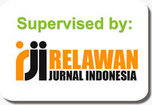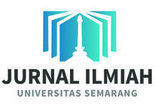Evaluating the Popularity of Programming Languages in Indonesia using the MABAC Method
Abstract
Keywords
Full Text:
PDF (Bahasa Indonesia)References
Bissyande TF, Thung F, Lo D, Jiang L, Reveillere L. Popularity, interoperability, and impact of programming languages in 100,000 open-source projects. Proceedings - International Computer Software and Applications Conference, IEEE Computer Society; 2013, p. 303–12. https://doi.org/10.1109/COMPSAC.2013.55.
Barua A, Thomas SW, Hassan AE. What are developers talking about? An analysis of topics and trends in Stack Overflow. Empirical Software Engineering 2014; 19:619–54. https://doi.org/10.1007/s10664-012-9231-y.
Swaroop. How accurate are the language ratings published in the TIOBE index. Quora 2021. https://qr.ae/pGBw16 (accessed November 18, 2021).
Alinezhad A, Javad K. New Methods and Applications in Multiple Attribute Decision Making (MADM). MABAC Method. In: New Methods and Applications in Multiple Attribute Decision Making (MADM). International Series in Operations Research & Management Science, vol 277, Springer, Cam.; 2019, p. 193–8. https://doi.org/10.1007/978-3-030-15009-9_25.
Stević Ž, Pamučar D, Vasiljević M, Stojić G, Korica S. Novel integrated multi-criteria model for supplier selection: Case study construction company. Symmetry (Basel) 2017;9. https://doi.org/10.3390/sym9110279.
Wang J, Wei G, Wei C, Wei Y. MABAC method for multiple attribute group decision making under q-rung orthopair fuzzy environment. Defence Technology 2020; 16:208–16. https://doi.org/10.1016/j.dt.2019.06.019.
Pamučar D, Stević Ž, Zavadskas EK. Integration of interval rough AHP and interval rough MABAC methods for evaluating university web pages. Applied Soft Computing Journal 2018; 67:141–63. https://doi.org/10.1016/j.asoc.2018.02.057.
Xue-Guo X, Shi H, Li-Jun Z, Hu-Chen L. Green supplier evaluation and selection with an extended MABAC method under the heterogeneous information environment. Sustainability (Switzerland) 2019;11. https://doi.org/10.3390/su11236616.
Widodo E, Hadi S. Analisis Popularitas Bahasa Pemrograman Menggunakan Metode Simpe Multi Attribure Rating Technique (SMART) Untuk Menentukan Pilihan Dalam Mempelajari Bahasa Pemrograman. E-PROSIDING SEMINAR NASIONAL HASIL PENELITIAN LPPM UNIVERSITAS SEMARANG 2021:301–5.
Wdzięczna D. SQL Pattern Matching 2017. https://learnsql.com/blog/using-like-match-patterns-sql/ (accessed June 7, 2021).
DOI: http://dx.doi.org/10.26623/transformatika.v21i2.7001
Refbacks
- There are currently no refbacks.
| View My Stats |
Jurnal Transformatika : Journal Information Technology by Department of Information Technology, Faculty of Information Technology and Communication, Semarang University is licensed under a Creative Commons Attribution 4.0 International License.









